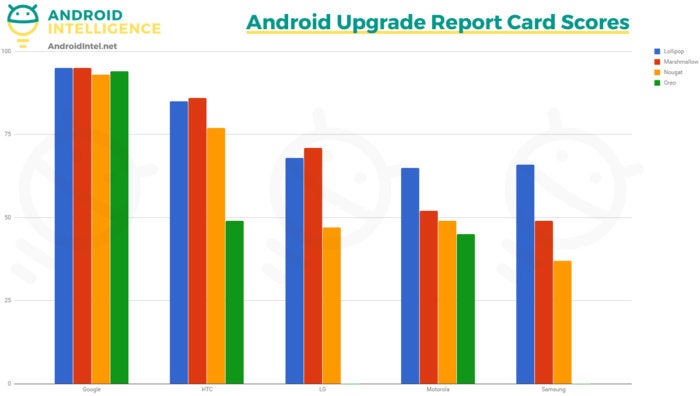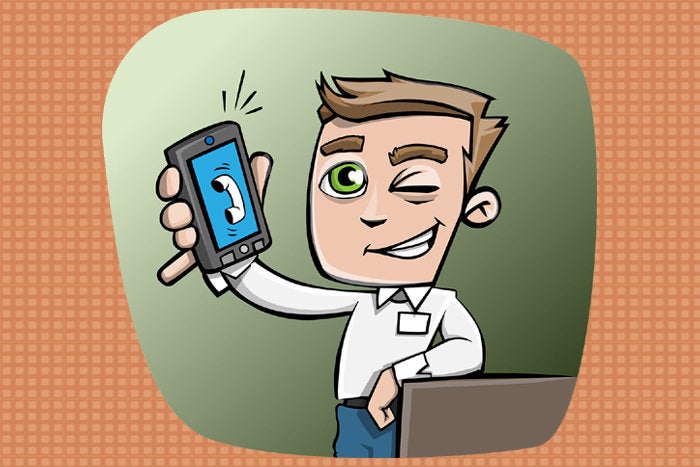By my calculations, seeing this morning's news that LG is opening up a "Software Upgrade Center" — the industry's "first such facility aimed at providing customers worldwide with faster, timelier smartphone operating system and software updates" (!) — could result in three distinct reactions.
First is the woefully uninformed, overly positive reception — the one LG clearly hopes to elicit with its over-the-top press release: "Whoa! Look at LG! It's breaking new ground and showing just how committed to customers it really is."
Second is the guardedly optimistic view: "Look, I know LG has never been the best with Android upgrades, but it always tries. Maybe this will be a new beginning. Maybe things are about to get great!"
And third is the seriously skeptical view: "Riiiiight. LG always talks a good game with Android upgrades, but it never actually delivers. Looks like more of the same ol' silliness we see every year."
Me? As someone who's tracked and analyzed Android upgrades closely since the start, I tend to veer more toward that final view of skepticism. But I'm holding out a shred of hope — an ever-so-microscopic one — that maybe, just maybe, this'll be the time things change (at least a little).
Let's be honest, though: It's hard to feel too hopeful. After all, we all know the ugly truth about Android upgrades by now. (And for context, we also know there's more to the story than what we see on the surface — right?) This chart from my four-year-long analysis of Android upgrade performance tells you everything you need to know about how most manufacturers are faring:
 JR Raphael
JR Raphael
(Click image to enlarge)
What makes LG exceptional in this field of failure is the level of bravado that tends to accompany its indifference: Despite taking increasingly embarrassing amounts of time to deliver major software upgrades to top-tier Android devices, LG continually puts out boastful press releases that tout its efforts and try to make them sound not only impressive but also industry-leading.
LG, in other words, loves to talk. The company loves making boldly worded announcements about its Android upgrade accomplishments. But those declarations always end up being empty words — marketing-ready bragging rights, often based on technicalities and with little meaningful action alongside them.
In 2014, for instance, LG pushed out a press release praising the fact that it was the "first" manufacturer to roll out the Android 5.0 Lollipop upgrade to users. In reality, that rollout was a small soak test for a limited number of device-owners in Poland, and it took a full three months for the software to reach anyone in the States — and another two months for it to hit the company's previous-gen U.S. flagship.
LG did the same thing with 2015's Android upgrade and made a similar move again with 2016's OS rollout. The company even launched a major marketing campaign about having the "first new smartphone to be launched with Android 7.0," despite the fact that that simply wasn't true. It's gotten to the point where LG's Android-oriented press releases have basically become a joke among those of us who observe this area. As a certain smart-alecky writer once put it, the company truly does excel at one thing in this domain: being the first to announce a new OS rollout.
 JR
JR
Sensing the pattern?
In reality, LG has still yet to deliver 2017's Android 8.0 Oreo software to either its current-gen LG G6 flagship or its previous-gen LG G5 flagship. And today marks 235 days — nearly eight entire months — since Oreo's release. (The company did get Oreo out to its secondary V30 phone shortly after the six-month mark, so that's something — but it's still far from being acceptable, let alone commendable.)
LG says one of the first initiatives of its "Software Upgrade Center," incidentally, will be getting Oreo out to the G6 ("later this month starting in Korea, followed by other key markets") — but if it takes creating and announcing an entire new division for you to get a major software update onto your current flagship eight months after the fact, I don't know that you should be gloating.
I bring all of this up not to bash LG unnecessarily but to provide a reality check to the company's reliably lofty words. This week's press release feels just a touch too similar to all of LG's previous Android upgrade proclamations — and we all know how little those turned out to mean in practical terms.
So LG, I really want to believe that this time is different — that this time, you've changed. I want to be optimistic. But when you've made so many similarly grand and ultimately empty gestures in the past, well, it's hard not to feel just a teensy bit skeptical.
We all know you're great at putting out impressive-sounding press releases, LG. Follow it up with meaningful action this time, and then we'll talk.
Sign up for JR's new weekly newsletter to get this column along with bonus tips, personal recommendations, and other exclusive extras delivered to your inbox.

[Android Intelligence videos at Computerworld]






